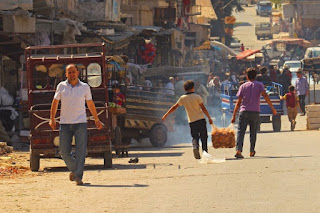 |
| Mali trooper leads a hostage to safety Bamako, Mali citylab.com |
Brainy blogger is back from a five-day karmic re-alignment retreat and a little dismayed to find that #historichappyhour has left the place a mess. Nevertheless, the hashtag was appropriately remorseful, cleaned up the food and beverages. Now we can return to the business at hand, the plague of "fragile states" and how cities can provide a cure.
The horrifying events that transpired in Paris on Friday November 13, served as a very loud and clear reminder that "fragile states" such as Syria are frequently hotbeds for violence. In his article for CityLab titled, "How Stronger Cities Could Help Fix Fragile Nations," Richard Florida observes, "These states are not only less developed and less affluent-with lower levels of education and far lower lower levels of tolerance-they are also the least urbanized." Syria and like nation-states need more than military intervention and national security initiatives, which only serve a short-term strategy. Mr. Florida suggests that "part of the long term strategy to revive these dysfunctional states must focus on city-building and urbanization."
 |
| Damascus, Syria (?) Ammar Abdullah/REUTERS citylab.com |
 |
| "Fragile States Index: Fragility in the World 2015" www.fundforpeace.org citylab.org |
Syria continued to crumble as civil war raged on and Da'esh, or the Islamic State, added a new brutal dimension to the conflict. (Ibid)
Syria joins Pakistan, Afghanistan, Iraq, Yemen, Congo, and Chad in the "high alert" category. Richard Florida writes, "Even less stable are the four African nations of Somalia, Sudan, South Sudan, and the Central African Republic, which all make up the 'very high alert' category." In total, 38 nations are listed as either "alert, high alert" or "very high alert" based on levels of instability. On the opposite end of the spectrum, Finland was the sole nation-state to qualify under the heading of "very sustainable." A group of 14 European and Scandinavian countries such as: Sweden, Switzerland, and the Netherlands earned a rating of "sustainable." Eleven other European nations, the United States, and United Kingdom qualified as "highly stable." However, what are the character defining features of the world's fragile nation-states and what are their indicators?
 |
| La Pyramide Market Photograph by Iwan Baan Abidjan, Cote d'Ivoire the guardian.com |
To find out the answers to these questions, Richard Florida and his colleague at the Martin Prosperity Institute, Charlotte Melander, studied the correlations between the FSI and a host of demographic, social, and economic traits of more than hundred nations. As always, Mr. Florida added this caveat, "I remind readers that these correlations do not necessarily imply causation, but rather and association between variables." Be that as it may, the findings support the role of urbanization and city building, as well as other factors, in the fragility of nations.
It should not be a surprise that world's most delicate nation-states are poorer and less developed. Mr. Florida writes, "The Fragile States Index is negatively associated with economic output per capita (-.88), the Global Competitiveness [sic] Index by World Economic (-.82), and the UN's Human Development Index (-.87). It is also negatively associated with levels of education and human capital (-.80)." Fragile States also tend to be less tolerant. Specifically, "The Fragile States Index is negatively correlated with a combined measure of tolerance toward ethnic and religious minorities and gays and lesbians (-.74)."
 |
| Mosul, Iraq borgenmagazine.com |
Additionally, nation-state instability goes hand-in-hand with lower rates of urbanization (a -.7 correlation). Richard Florida writes, "The less urbanized a state, the smaller and less functional its cities, and the more fragile and insecure it tends to be."
As the United States and its European contemplate military action in the Middle East, it is necessary to consider the merit of further intervention. Richard Florida writes, "Military intervention by its very nature tends to damage and destroy large cities, disperse population, and lead to a vicious cycle of less urbanization and and even greater instability, with Syria being the most obvious case in point today." The point being is that is that it is not enough just to "blast a country back to the Stone Age," you need to have a strategy to win the peace. The strategy for winning the peace is city-regional building. Perhaps, the powers that be need to go back on look at the way Europe and Asia following World War II. Granted, the motivation behind was politics but the outcome was countries that moved away from the conditions that bred instability and extremism toward more stable conditions. However, city-regional building requires long-term commitment and patience. Something to consider.
No comments:
Post a Comment